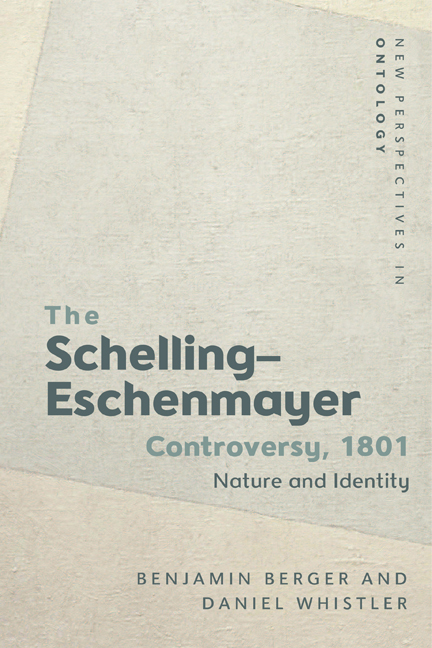Book contents
- Frontmatter
- Contents
- Preface
- Translators’ Note
- Abbreviations
- Introduction: Schelling and Eschenmayer in 1801
- Part I Texts
- Spontaneity = World Soul, or the Highest Principle of Philosophy of Nature
- On the True Concept of Philosophy of Nature and the Correct Way of Solving its Problems
- Part II Commentaries
- 1 Quality
- 2 Potency
- 3 Identity
- 4 Drive
- 5 Abstraction
- Part III Appendices
- Appendix 1 Correspondence, 1799–1801
- Appendix 2 Principles of Nature-Metaphysics Applied to Chemical and Medical Subjects [Extracts]
- Appendix 3 Deduction of the Living Organism [Extracts]
- Appendix 4 Review of F. W. J. Schelling’s First Outline of a System of Philosophy of Nature and Introduction to his Outline
- Notes
- Bibliography
- Index
Introduction: Schelling and Eschenmayer in 1801
Published online by Cambridge University Press: 03 October 2020
- Frontmatter
- Contents
- Preface
- Translators’ Note
- Abbreviations
- Introduction: Schelling and Eschenmayer in 1801
- Part I Texts
- Spontaneity = World Soul, or the Highest Principle of Philosophy of Nature
- On the True Concept of Philosophy of Nature and the Correct Way of Solving its Problems
- Part II Commentaries
- 1 Quality
- 2 Potency
- 3 Identity
- 4 Drive
- 5 Abstraction
- Part III Appendices
- Appendix 1 Correspondence, 1799–1801
- Appendix 2 Principles of Nature-Metaphysics Applied to Chemical and Medical Subjects [Extracts]
- Appendix 3 Deduction of the Living Organism [Extracts]
- Appendix 4 Review of F. W. J. Schelling’s First Outline of a System of Philosophy of Nature and Introduction to his Outline
- Notes
- Bibliography
- Index
Summary
A. C. A. Eschenmayer (1768–1852) and F. W. J. Schelling (1775–1854) were born fairly close to one another in neighbouring towns west of Stuttgart (Neuenbürg and Leonberg), and, during the mid-1790s, both attended the University of Tübingen (although in different faculties); yet, the first recorded contact between them dates from 1797, in a now-lost letter in which Eschenmayer sent Schelling a copy of his newly completed dissertation on the philosophy of nature. It is to this dissertation that Schelling refers in his first published reference to Eschenmayer at the end of the 1797 Ideas for a Philosophy of Nature. Over the subsequent two years, Eschenmayer's and Schelling's thought evolved considerably, and, in 1799, Schelling took up correspondence with Eschenmayer once more to request an essay for publication in his planned Journal for Speculative Physics. In September 1800, Schelling did finally receive something from Eschenmayer: a sixty-eight-page critique of Schelling's own First Outline of a System of the Philosophy of Nature. It appeared in January 1801 and was immediately followed by a substantial ‘appendix’ by the editor – that is, Schelling – under the title Appendix to Eschenmayer's Essay concerning the True Concept of Philosophy of Nature and the Correct Way of Solving its Problems. Schelling himself presented this appendix to Eschenmayer in correspondence as a means ‘to come to a complete understanding’ with him, although there is little reason to believe that Schelling was in fact optimistic about their coming to any substantive philosophical agreement. Indeed, despite Schelling's positive allusions to Eschenmayer in the 1801 Presentation of my System of Philosophyand the 1802 dialogue, On the Absolute System of Identity, the controversy of 1801 only led the two philosophers to commit more fully to their fundamental disagreements, as evidenced by Eschenmayer's subsequent review of both the First Outlineand the Introduction to the Outline, as well as his biting refutation of the Presentationin a letter sent to Schelling in summer 1801 – a letter that put an end to their correspondence for three years.
These are the basic historical details that gave rise to one of the more important intellectual disputes in German Idealism and the philosophy of nature.
- Type
- Chapter
- Information
- The Schelling-Eschenmayer Controversy, 1801Nature and Identity, pp. 1 - 14Publisher: Edinburgh University PressPrint publication year: 2020



